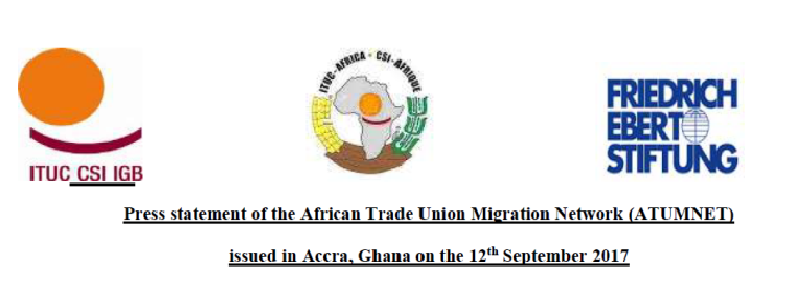
African trade unions and the quest for better migration management: making migration work for development and migrants
The African Trade Union Migration Network (ATUMNET) is a platform for all national trade union organisations in the 52 of the 55 African countries affiliated to the African Regional Organisation of the International Trade Union Confederation (ITUC-Africa) and are engaged on migration issues.
The network gathered in Accra Ghana from 11-12 September 2017 with support of the Friedrich Ebert Stiftung (FES) and also having in attendance our trade union counterparts from Asia to look at Fair Recruitment issue in relation to labour migration.
At the end of the 2-day event, the Network observed the following:
• Migration remains and will continue to be a historic human phenomenon that cannot be stopped, but can be well and effectively managed to transmit gains of development to the sending, transit and receiving/host countries as well as to the migrants themselves.
• Push factors such as poverty; endemic unemployment, more amongst young persons; marginalization; political persecution; civil conflicts; climate change effects; bad governance; weak and grossly inadequate public services delivery; Illicit Financial Flows driven by corporate greed amongst others are still making migration a zero-sum choice and game especially in Africa.
• The current global migration management of using populism and short-lived tokenisms in response to political and electoral expediencies that are leading to migrants being seen and treated as unwelcomed is equally spiking extremism and hate crimes against migrants and their families by nationals. These will not solve the current global migration conundrum.
• Most African migrants are moving within the continent, but Africa’s integration is still weak.
• Bilateral Labour Migration Agreements (BLMAs) signed by African governments with other governments notably those from the Gulf States have very little human and workers’ rights protection provisions. This is contributing to the situation where recruited labour migrants end up in bond labour and slavery when they get to the shores of the host country. The situation of African migrants in Saudi Arabia is the most worrisome for us.
• The Valletta Process between the European Union and the African Union is throwing up lots of concerns with respect to the protection of the rights of migrants and refugee seekers. Notably, we continued to be seriously worried about the externalization of borders principle contained in the Valletta outcome, which the EU countries are pushing at different pace and levels. An immediate worry is the France-select African countries summit that pushed for the establishment of Asylum clearing centers, so called “hotspots” in Chad and Niger.
• There still exist in Africa very weak regulation and inspection regimes for labour recruitment agencies. Thus, most recruitment agencies continue to exploit labour migrants and potential labour migrants. Some agencies have even become human smuggling and trafficking outfit under the guise of rendering recruitment services.
• Ignorance has continued to play a big role in rash and rushed migration decisions African migrants make. It has also exacerbated their exploitations in the hands of unscrupulous recruitment agencies.
• The tales and ordeals of women, mostly domestic workers, in the hands of recruitment agencies and their host employers, notably in the Gulf Coordinating Council (GCC) States with special focus on Saudi Arabia have been harrowing and depressing, which must stop.
• The Kafala system practiced by the GCC States re-emphasises and re-enforces slavery, caste and exploitation. It must be reformed.
To this end, the network members have resolved to:
• Continue to engage African governments through alternative pro-people socio-economic prescriptions with the view to contribute to defeat poverty, want and misery on our continent. By so doing, migration will remain a voluntary option. This is daunting, but achievable.
• Urge African governments to genuinely work on improving Africa’s integration. The African Union’s declaration to achieve visa on arrival for Africans bearing African passports by 2018; skills development and measurability as well as social protection portability are good initiatives to be achieved. These will contribute to freer movement of persons, human energies, ideas and talents and Africa’s development aspirations will be the better for it.
• Step up advocacy and advice to African governments on the need to sign Bilateral Labour Migration Agreements that provides for measures and spaces for the protection of the human and workers’ rights of migrants. African trade union organisations will push for participation in the agreement development, signing and monitoring processes.
• We will continue to oppose the EU border externalization practices by campaigning for African governments and the African Union to refuse to enter into such agreements as well as insist on genuine collective engagement as against the current EU divide and rule engagement style.
• Call on African governments to develop and improve recruitment agency regulations in ways that will improve and not distort or eclipse employment relationships as well as deepen labour migrants exploitations.
• Still on recruitment agencies, African trade unions will scale up their advocacy on effective labour inspection regimes and practices as well as demand for sifter sanctions against unfair labour employment and relations practices.
• We will continue to work with our counterparts in other continents to ensure that pro-rights global migration governance is attained. This is what we are already doing within the UN Global Compact on Safe, Fair and Orderly Migration process. We shall use this collaboration and advocacy to cause the reform of the Kafala system.
Thank you.
